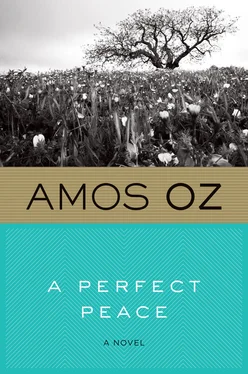I tried to explain, delicately sketching a brief portrait, but evidently without success, because the sergeant put a finger to his forehead, looked at me for confirmation, and joked, "I'd have run away from someone like that myself."
"And I most certainly would not have," I said, amazed at the sternness of my voice. It wiped the asinine smirk off his face immediately.
"Well, we aren't much the wiser," said the captain. "The most important thing now is to get some good photographs."
It soon turned out, however, that there were no photographs of Yonatan. Except for a few childhood snapshots and one useless picture of him standing by a jeep with Rimona on their honeymoon, an Arab kaffiyeh around his head, and another, blurry shot from an old issue of the army magazine.
After the police departed, the telephone rang. It was Chupka, Yonatan's commanding officer.
"Is that Srulik? Here's the latest from this end. We already have a few of our men out in the field. Our'S.I.O. has been in your area for the past two days with some trackers. And we've got a stoolie on the other side of the border, right opposite you. We'll be talking to him tonight." (What was an'S.I.O.? A stoolie? I was embarrassed to ask.)
"And another thing," Chupka went on, "do you have anyone there who knows anything about maps? You maybe? Or somebody younger?"
"We might," I said. "Why?"
"I want you to go to Yoni's room and look very carefully for a box of maps. Last autumn he walked off with a whole set of 1:20,000 of mine and never returned them. Check it out. Or shall I send someone to do it?"
"What exactly do you want us to check?"
"See if there's a map missing. Because he took a complete set."
"Excuse me," I said. "Do you really need the whole set right now? Is it that urgent?"
"You don't get me, my friend," drawled Chupka. "If there's a particular map missing, that means Yoni probably took it with him. That could give us a clue where to start looking for him."
"How extraordinary," I said. "But of course. We'll check right now. That's a brilliant idea."
"Come off it, man," said Chupka, clearly appalled by my praises. "Just make sure you get in touch with me tonight to let me know, okay?"
"Agreed," I said. And added, swallowing my pride, "Right. Okay."
"And don't go making any waves."
"Waves?"
"I mean the press and all that. He may still be alive, and we don't want to make him look bad."
What a strange breed these young people are. Like a foreign people almost, as if in them our race were disguising itself so that even our worst enemies will no longer be able to recognize us. What worlds apart they and I. And yet I would give everything I have right now not just to have a son of my own, but for him to be just like them. Anything! Only what do I have to give? My old flute? Six shirts? Two pairs of shoes? Or the dozens of notebooks in this journal? In short, nothing, not a thing. And this leads me to another, in a certain sense, theological observation. Does not this inner urge to give our all for what we can never have bear a mysterious resemblance to the inner workings of the universe itself, to the orbits of the stars, the procession of the seasons, the migrations of the birds that I have been reading about in Griffin? Perhaps the correct word is not urge but yearning.
Back to today's events. At ten o'clock I picked up Hava at the sewing shop and went with her to see Yolek. Rimona and Azariah were already there, he sitting at one end of the couch and she on the straw mat at his feet. In the dimly lighted room, framed by all his books, Yolek indeed looked the gray eminence, veiled as he was by clouds of cigarette smoke. Azariah was puffing away too. Had we interrupted a political argument? A discussion of Spinoza? Azariah's guitar was lying at his left, between the couch and desk. Had he been intending to play? When he saw us, Yolek's eyes shone with amusement.
"Well, you tsaddik, you, how are you enjoying yourself?"
"Enjoying?"
"Your new job. How is the secretary of the kibbutz feeling today? Is everything under control?"
"Srulik," interrupted Hava, "has more brains and human charity in his little finger than you do in your whole world-famous head."
" Na. What do you say to that? Now my own wife has fallen in love with him too. Ah, well. At least, thank God, he's taken her off my back. I promise you that he'll soon wish that he hadn't. In my own humble opinion, though, it's an excellent reason to propose a little toast. Rimon'ka, if it's not too much to ask of you, you'll find the bottle hiding down there, behind the Hebrew dictionary."
"Don't you dare!" Hava hissed at him. "Didn't you hear what the doctor said?"
And Azariah had an aside of his own. "Stepan gave Alyosha his most precious stones. Alyosha got mad and broke Stepan's bones."
I had intended to maneuver Azariah into the other room to ask him to look for Yoni's map box and bring it to the office, but just then the door opened and in walked the Prime Minister. He entered without his entourage, a bit sheepish-looking, if ponderous, his blue shirt sticking out of his trousers, his shoes spattered with mud. He gripped Hava by the shoulders and gave her a kiss on the forehead. Yolek offered him tea and, without waiting for an answer, told Rimona to bring him some. I was amazed to notice moisture, in fact an actual tear, in Yolek's hard little eyes. He, of course, was quick to blame it on his allergy. Meanwhile, Hava had dashed off to the kitchen, where she took out a fancy white tablecloth and began preparing hot and cold drinks, fruit, and cake, making use of her best china. I couldn't keep back a little smile.
It was no time before Yolek and Eshkol were joking and bantering away. From my corner I could see Azariah devouring our guest with glittering eyes. His mouth hung slightly open, as if he were an adolescent peeking beneath a woman's dress. Once more I smiled to myself. And when, presumably in jest, Eshkol challenged Yolek to a fistfight, I couldn't resist offering to move aside the furniture to provide a proper ring for them to box in. Everyone laughed except me. Incidentally, I liked the Prime Minister at first. He struck me as a compassionate man. Not that he was above taking digs at our Yolek, which digs, I'm sorry to say, I enjoyed. At one point I was tempted to interrupt with my usual sermon about the duty incumbent on us all not to cause unnecessary pain. I managed, however, to restrain myself. Which is more than can be said of Azariah Gitlin.
When the Prime Minister rose to leave, Azariah astonished us all by breaking into a long, confused tirade. In vain Hava and I tried to make him desist. Yolek and Eshkol seemed secretly united in taking a strange pleasure in it. They even, so I thought, egged the boy on, as if they wanted him to make more and more of an ass of himself. I suddenly felt as out of place as a teetotaler in a room full of drunks. Was I the only man there capable of any sympathy for Azariah? Did Azariah's contortions tickle their funny bones? I didn't understand any of it.
In any event, I lost all sympathy for Eshkol. All my life I have found those men hard to take. Their concealed hatreds, their cunning, their self-induced illnesses, their endless recourse to Yiddish and quotes from the Bible. Even though for years I've tried to become one of them myself, deep down I feel proud for never having succeeded. Azariah wasn't much better. He ran amuck with old Russian saws, insults, and prophecies. Finally, after Eshkol had promised to extend all possible help and taken his leave, Yolek plied Azariah with brandy and even praised the poor fellow for his insolence. Eventually another guest arrived, a stout, dandyish person in a light flannel suit and a smartly trimmed Vandyke beard. He had the appearance of a worldly artist and reeked as much of smug success as of expensive cologne. His toneless, slightly nasal voice had a faint American accent. He sounded as if a pipe were clenched between his teeth.
Читать дальше












